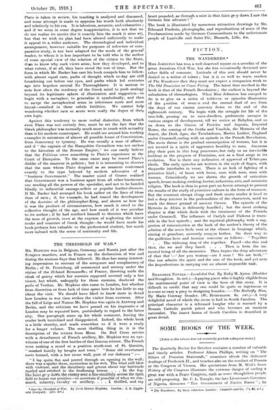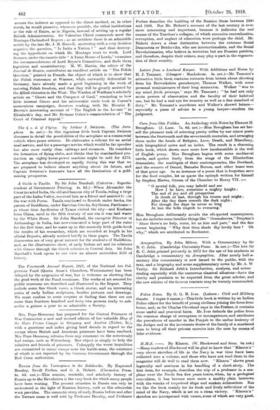SOME BOOKS OF THE WEEK.
[Notice in this column dies not necessarily preclude subsequent review.)
The Quarterly Review for October contains a number of valuable and timely articles. Professor Alison Phillips, writing on " The Ethics of Prussian Statecraft," examines afresh the dishonest dealings of Frederick II., and touches also on the conduct of Prussia at the Congress of Vienna. His quotations from M. Weil's Inner History of the Congress illustrate the extreme danger of ending a great war with a Peaco Congress, such as some thoughtless people are still proposing. Mr. C. L. Temple, the late Lieutenant-Governor of Nigeria, discusses " Tke Government of Native Races " ; ho • The Wanderers. By Mary Johnston. London : Constable and Co. j^s. 6d. net.)
avours the indirect as opposed to the direct method, or, in other words, he would preserve, wherever possible, the tribal institutions or the rule of Emirs, as in Nigeria, instead of setting up a regular British Administration. Sir Valentine Chirol commends anew the Montagu-Chelmsford Report ; as an antidote there is an admirable article by the late Mr. J. M. Russell, answering with a very decisive negative the question, " Is India a Nation ? " and thus destroy. ing the hypothesis on whioh Mr. Montagu went to work. Lord Sumner, under the caustic title " A Tame House of Lords," examines the recommendations of Lord Bryce's Committee, and finds them Ingenious and unsatisfactory. M. W. Martin, the editor of the Journal de Geneve, contributes an excellent article on " The Polish Question," printed in Frenoh, the object of which is to show that the Polish statesmen at Warsaw, while outwardly deferential to Germany, have already made a good beginning in the work of restoring Polish freedom, and that they will be greatly assisted by the Allied victories in the West. The Warden of Wadham's scholarly article on " Cicero and the Conquest of Gaul," reminding us how little interest Cicero and his aristocratic circle took in Caesar's momentous campaigns, deserves reading, with Mr. Horatio F. Brown's interesting account of " The English in the Lovant " in Elizabeth's day, and Mr. Herman Cohen's commendation of " The Court of Criminal Appeal."



































 Previous page
Previous page